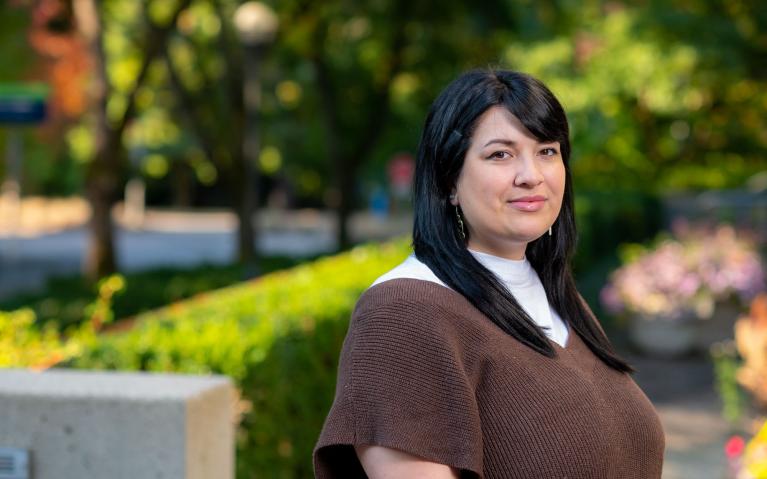
Cheyanne Connell
Doctor of Philosophy in Anthropology (PhD)
Research Topic
Naachin of Past and Present
Mark Turin (PhD, Linguistics, Leiden University, 2006) is an anthropologist, linguist and occasional radio presenter, and an Associate Professor of Anthropology at the University of British Columbia. From 2014-2018, Dr. Turin served as Chair of the First Nations and Endangered Languages Program and from 2016-2018, as Acting Co-Director of the University’s new Institute for Critical Indigenous Studies. Before joining UBC, he was an Associate Research Scientist with the South Asian Studies Council at Yale University, and the Founding Program Director of the Yale Himalaya Initiative. He continues to hold an appointment as Visiting Associate Professor at the Yale School Forestry & Environmental Studies. Prior to Yale, Dr. Turin worked a Research Associate at the Museum of Archaeology and Anthropology at the University of Cambridge. At UBC, Dr. Turin is an Associate Member of the Department of Asian Studies an Affiliate Member of the Institute of Asian Research.
G+PS regularly provides virtual sessions that focus on admission requirements and procedures and tips how to improve your application.
These videos contain some general advice from faculty across UBC on finding and reaching out to a potential thesis supervisor.
Mark is an absolutely exceptional supervisor. Never in my academic or professional career have I felt so supported by a supervisor. I have no doubts that Mark constantly has my best interests at heart and he works tirelessly to support my scholastic, professional, and personal development. Words fall short as I try to articulate how grateful I am to study under the guidance of such a person. Perhaps the best way for me to describe him is as a dreamweaver, as I truly feel that this is his intention and capacity.
Dissertations completed in 2010 or later are listed below. Please note that there is a 6-12 month delay to add the latest dissertations.
The full abstract for this thesis is available in the body of the thesis, and will be available when the embargo expires.
View record
The full abstract for this thesis is available in the body of the thesis, and will be available when the embargo expires.
View record
Theses completed in 2010 or later are listed below. Please note that there is a 6-12 month delay to add the latest theses.
Many newcomers to Canada experience significant difficulties as they adjust to life in their new community, with few being more challenging than their journey to become English speakers. While Canada’s espousal of a welcoming, multicultural national identity, as well as its federally funded Language Instruction for Newcomers to Canada (LINC) program, suggest cohesive social integration, the historical consequences of the discourse of neoliberal multiculturalism and language ideologies of monolingualism and standardization that inform the LINC program have only served to assimilate and marginalize newcomers. The disruptions that COVID-19 brought to LINC classes only further complicated and exacerbated many of the issues that newcomers were already facing. However, despite these challenges, the incorporation of digital technologies into the LINC class as a way to adjust to the reality of the pandemic has created a new space outside of the class, yet still within the LINC community, through which a transformative, translingual pedagogy has the potential to take root. With appropriate guidance, the adoption of a translingual pedagogy has the potential to both work against the problematic discourses perpetuating within Canada, as well as improve the students’ English language learning outcomes by providing increased opportunities for digital literacy socialization.
View record
In this thesis, I investigate the silenced histories of Indigenous peoples who have been written out of collective memory, official documents and, in some cases, their own family histories. I show how the actions of colonists can be explained through a colonial-Marxist lens of historical materialism and how this methodologically creates space for colonialism which, consequently, strategically silences and erases Indigenous lives. I focus my research on a family who has searched for answers for over sixty years, the Beier family, to aid them in the search for the life story of George Ralph McKenzie, an Indigenous man who served in the Canadian military and who was erased from his family’s history. I gathered data, including but not limited to, birth and death certificates, photographs and documents to compile a probable or possible record of McKenzie’s existence. I exhausted available archival, historical, religious, genealogical, public, private, professional and governmental databases and resources. Knowledge and interactions of Indigenous presences in areas coveted by European governments, during first-contact, provoked a need to design strategies to be used during interactions with Indigenous peoples. The Church has also been an integral part of many European governments and the alterations of interpretations and editing of religious texts have been used as a tool for maintaining public control for millenniums. Silencing Indigenous peoples through education was a deliberate and methodical form of colonization used to dominate Indigenous societies. During the wars in which Canada participated Indigenous peoples were, often, not accurately recorded. This is due to a systemic and structural type of diversion and Indigenous peoples were still considered to be dispensable at the time. Erasure cultivates within families, due to systemic and systematic racism and oppression of cultures and heritages. In 2017, Canada is oppressing and silencing Indigenous voices. Canada is using terms such as multiculturalism and diversity to boast about its acceptance and compassion for others while ignoring the needs of Indigenous peoples. Reconciliation will involve the decolonization or dismantling of an entire system of colonialism that is entrenched in the relationships, personal lives, politics, laws, and governments in Canada.
View record
If this is your researcher profile you can log in to the Faculty & Staff portal to update your details and provide recruitment preferences.